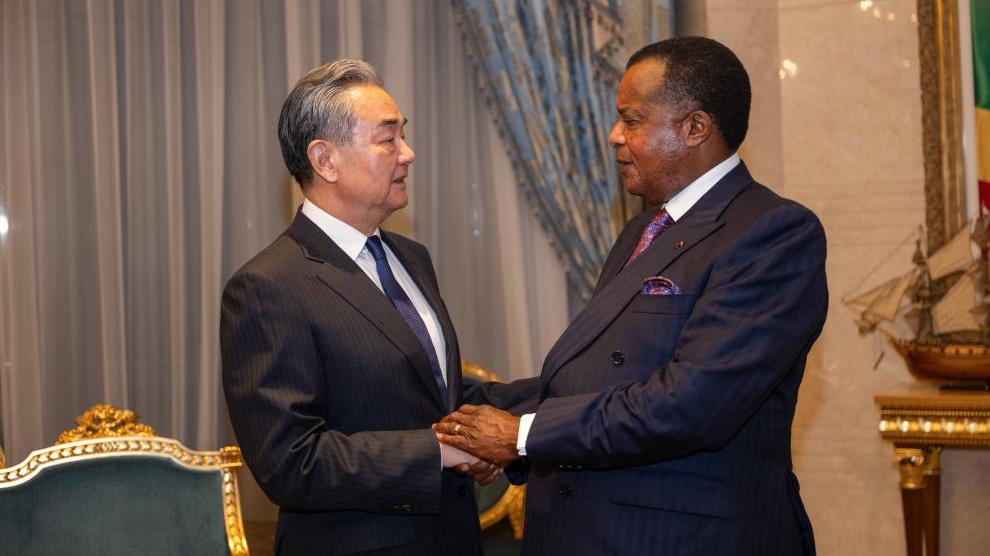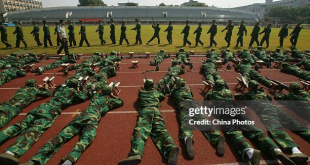
President of the Republic of the Congo Denis Sassou Nguessomeets with Chinese Foreign Minister Wang Yi, also a member of the Political Bureau of the Communist Party of China Central Committee, in Brazzaville, the Republic of the Congo, January 7, 2025. /Xinhua
Chinese Foreign Minister Wang Yi’s recent visit to Africa once again highlights the enduring depth and dynamism of China-Africa relations. It continues China’s tradition of prioritizing Africa as its foreign minister’s first overseas destination each year, a symbolic gesture that has spanned over three decades. And it also goes beyond symbolism.
This tour was also rooted in tangible objectives, emphasizing economic cooperation, security collaboration, and diplomatic alignment with African nations.
Africa holds a pivotal place in China’s global strategy as an emerging market and a partner in reshaping global governance. Wang Yi, who is also a member of the Political Bureau of the Communist Party of China Central Committee and director of the Office of the Central Commission, visited Namibia, the Republic of the Congo, Chad, and Nigeria, demonstrating China’s intent to deepen bilateral and multilateral ties. These engagements reflect a strategic partnership that aims to support Africa’s developmental priorities while advancing China’s geopolitical interests.
A primary focus of the visit was the reinforcement of economic cooperation. Wang Yi sought to align China’s investments with African nations’ development agendas, emphasizing infrastructure, industrialization, and renewable energy. Africa’s need for infrastructure remains critical, with gaps in transportation, energy, and digital connectivity limiting the growth potential. The discussions centered on financing new projects and sustaining existing ones, reaffirming China’s commitment to bridging these gaps.
One highlight of the visit was China’s pledge of $136 million in military assistance, along with plans to train 6,000 troops and 1,000 police officers. This initiative underscores China’s increasing role in addressing the continent’s security challenges. From combating terrorism in the north-central region of Sahel to mitigating maritime piracy along the Gulf of Guinea, Africa’s security concerns have global ramifications. China’s involvement in these areas signals its willingness to support Africa’s stability, which is a prerequisite for sustainable economic development.
The visit also advanced China’s support for Africa’s aspirations on the global stage. A key theme in the discussions was China’s push for the African Union’s membership in the G20. This proposal reflects the shared desire for a reformed global governance structure that amplifies the voices of developing nations. By championing Africa’s inclusion in such forums, China has proved itself as an advocate for the Global South, fostering solidarity with African countries in their pursuit of equity in international decision-making processes.
The role of cultural and educational exchanges in strengthening ties was also emphasized. Agreements were reached to enhance academic cooperation, enabling more African students to study in China and facilitating knowledge transfer in science, technology, and innovation. These initiatives are designed to empower African youth, equipping them with skills to drive the continent’s development in the 21st century.
Energy cooperation was another significant focus. With Africa’s renewable energy potential largely untapped, China is keen to play a role in the transition to cleaner energy sources. Discussions explored partnerships in solar, wind, and hydropower projects, which can not only address Africa’s energy deficits but also contribute to global efforts to combat climate change.
In Nigeria, the final stop of Wang Yi’s tour, the focus was on deepening economic and security ties with one of Africa’s largest economies. Nigeria has long been a strategic partner for China, with bilateral trade exceeding $20 billion annually. The Chinese foreign minister reiterated Beijing’s commitment to supporting Nigeria’s infrastructure development, including ongoing projects such as railways, highways, and energy facilities. Additionally, the military assistance package announced during the visit will bolster Nigeria’s efforts to combat insurgency and enhance regional stability.
Chinese Foreign Minister Wang Yi, also a member of the Political Bureau of the Communist Party of China Central Committee, and Nigerian Foreign Minister Yusuf Tuggar meet the press in Abuja, Nigeria, January 9, 2025. /Xinhua
Debt sustainability also featured prominently in Wang Yi’s discussions with African leaders. China’s significant role as a lender to Africa has drawn both praise and scrutiny. During the visit, Wang Yi emphasized China’s willingness to work with African nations to restructure debt where necessary, ensuring that financial obligations do not undermine development efforts.
Another notable outcome of the visit was the reaffirmation of mutual respect as a cornerstone of China-Africa relations. Unlike some Western nations that have been accused of paternalism in their dealings with Africa, China emphasizes the principle of non-interference in domestic affairs. By respecting African sovereignty and tailoring its engagements to local contexts, China has cultivated goodwill that underpins its growing engagements with the continent.
Overall, Wang Yi’s visit underscores the multifaceted nature of China’s engagement with Africa. While economic and security interests remain at the forefront, the broader agenda includes cultural exchanges, diplomatic alignment, and shared aspirations for global reform. This comprehensive approach positions China as more than just a trade partner; it portrays Beijing as a collaborator in Africa’s quest for prosperity and global relevance.
As Africa navigates its path toward sustainable development, partnerships like the one with China play a crucial role. Wang Yi’s tour not only reaffirms China’s commitment to Africa but also illustrates the evolving nature of this relationship. The bonds forged during this visit are a testament to the enduring relevance of China-Africa ties in an increasingly interconnected world.
Stephen Ndegwa, a special commentator for CGTN, is the executive director of South-South Dialogues, a Nairobi-based communications development think tank.
cgtn.com
 Africa -China Review Africa -China Cooperation and Transformation
Africa -China Review Africa -China Cooperation and Transformation
